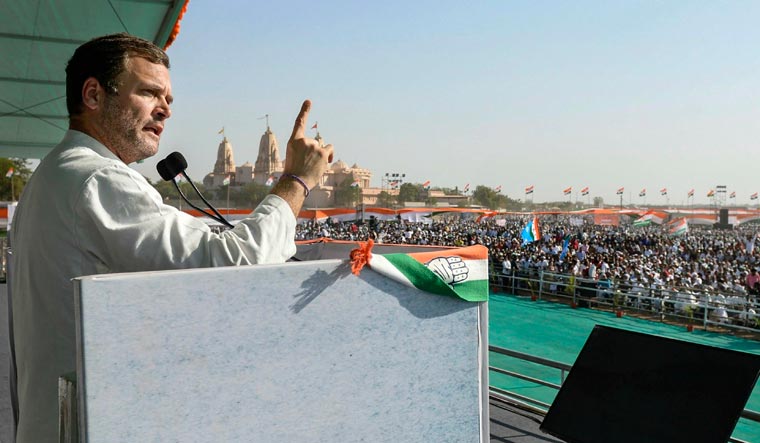The minimum income guarantee scheme, announced by Congress president Rahul Gandhi on Monday as his party's biggest promise for the Lok Sabha elections, works on the premise that Rs 12,000 per month is the basic requirement for a family to have a decent living. Hence, Rs 12,000 is the notional figure that the proposal is based on.
The calculations carried out by the people in the party, who worked on formulating the proposal, also being referred to by the Congress as NYAY, looked at various sets of data regarding poor and different income distribution. The party finally arrived at the figure of Rs 12,000 as the minimum income. The proposed scheme is expected to be the highlight of the Congress' manifesto, which is likely to be released on April 2.
Also Read
- Battle for Bengaluru explained: Who are in fray and what is at stake
- Sam Pitroda says '55% inheritance tax' remark twisted by BJP to divert attention
- Explainer: The Congress manifesto and the controversy around wealth inequality
- ‘Stone pelting, beheading of soldiers would have continued if Cong was in power: Modi
- PM Modi will never say 40 pc of country’s wealth is with just 1 pc of population: Cong
Going by the notional figure of Rs 12,000, 20 per cent of the poorest Indians, or 25 crore individuals or five crore families, would be the intended beneficiaries of the scheme as they earn less than that amount. A standard amount of Rs 6,000 as the assistance per month or a payment of Rs 72,000 annually to every such household has been worked out, as every Indian family that falls in the poorest 20 per cent category earns at least around Rs 6,000 a month. The scheme would then fill the gap through a direct cash transfer of Rs 6,000 per month into the accounts of the beneficiaries.
“Every Indian family in today's India should earn at least Rs 12,000 a month. Every Indian should be brought to a certain minimum income level. This will be the final attack on poverty,” said Praveen Chakravarty, head of the Congress' data analytics department.
Chakravarty, who was closely involved with the firming up of NYAY, said the proposal was in the works for the last three to four months, and involved consultations among leaders, primarily the Congress president, former prime minister Manmohan Singh and former finance minister P. Chidambaram.
“We studied the country's income distribution data. Experts across the world and in India were consulted before we arrived at the proposal,” he said.



